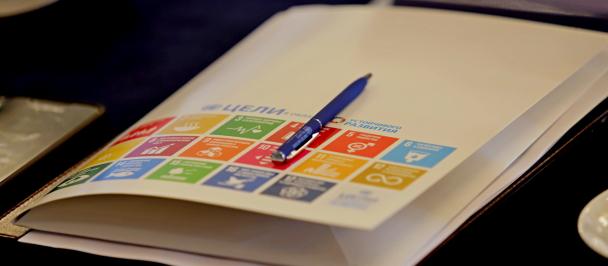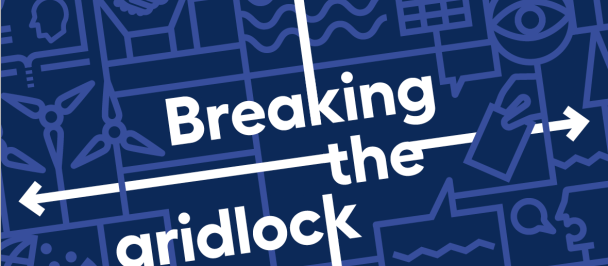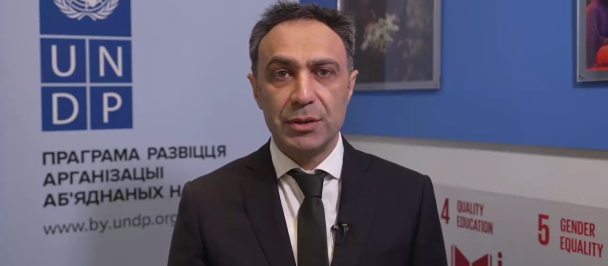Photograph: UNDP in Belarus
The Sustainable Development Goals are a call to action for all countries to improve the well-being of all people without exception and to preserve the planet. The 17 goals build on the results of the Millennium Development Goals and include emerging topics such as climate change, economic inequality, innovation, sustainable consumption, peace, and justice. Belarus is one of sixty countries implementing programmes of such kind.
In the Sustainable Development Report 2021, IMF estimates that the global need for additional spending on the SDGs is about 14 percent of global GDP a year by 2030. The program implemented by UNDP, UNICEF, UNFPA, UN Women and the Resident Coordinator Office in Belarus will allow to find new approaches to solving this challenge in Belarus. The goal of the program is to promote new financing tools for sustainable development with a focus on vulnerable populations. The UN agencies will implement their parts across various thematic areas with UNDP playing the coordinating role and working with other UN agencies on specific components to ensure continuity across SDGs.
UNDP is also partnering with the Ministry of Natural Resources and Environmental Protection to conduct a finance assessment in the area of environmental protection and sustainable use of natural resources (SDGs 12-15). A team of international and national experts will work together to analyze the existing costs and future financial needs to address environmental challenges in Belarus. Using the BioFin methodology, UNDP will analyze the financial resources allocated for issues related to the conservation and sustainable use of biodiversity, develop optimal options for reallocating existing and attracting new sources of funding. Based on the findings of the assessment, it will be possible to introduce innovative methods of budgeting in the management of natural resources and environmental protection in Belarus and thereby contribute to the improvement of national environmental programs and practices.
Within this programme UNFPA will support the healthcare system to improve efficiency of budget planning and spending. The agency will facilitate analysis, with special focus on reproductive health, and explore needs for services depending on gender. New approach will be based on emerging data and up-to-date scientific evidence. As a result, innovative cost-effective practices in the area of cervical cancer prevention, maternal health and gender-oriented budgeting will be introduced and piloted to track expenditures of budget resources in relation to the achieved outcome.
Furthermore, UNFPA and UNICEF in Belarus have initiated joint consultations with the Ministry of Health on strengthening capacities of public authorities and healthcare managers. The aim is to discuss normative cost-based budget planning methods per consumer and opportunities for aligning budgeting with SDGs. Apart from that, these UN agencies are talking with the Ministry of Labour and Social Protection on initiating dialogue for performance-based budgeting and capacity building for adolescents’ and assessment of the total volume and composition of budget allocations for children, adolescents, vulnerable families, and other vulnerable groups.
Apart from that, UNICEF in Belarus is focusing on measuring the impact of public expenditures contributing to achieving child-related SDGs and conducting a quarterly survey of the needs of families with children to advance the methodology for measuring multidimensional child poverty (MDCP). Additionally, UNICEF in Belarus is planning to assess the performance of social assistance to families with children through the lens of MDCP and carrying out a study on measuring public expenditure targeting children (child budget) in three cities (Minsk, Borisov, Molodechno) by the end of 2021.
Another agency, partaking in the joint efforts, is UN Women which works closely with the Ministry of Labor and Social Protection. Their goal is to strengthen the capacities of state employees to use gender-responsive budgeting tools in planning and budgeting. The agency plans to perform trainings and mentoring on gender analysis, promote the principle of equal rights and opportunities in development of state programmes. Besides UN Women will contribute to assessment of SDG indicators, disaggregated by sex, and work out specific recommendations in line with the National Action Plan on Gender Equality.
In total, after the programme is finalized, Belarus will be equipped with technical capacity and tools to continue its transition to performance-based budgeting in the areas of health care, social services and natural resources, with a focus on the development of gender-sensitive and child-focused normative budgeting methodology. In addition, the Programme envisages testing the methodology of normative budgeting. Its implementation is expected to help increase the efficiency of public services provision by improving budget planning and spending. In addition, the proposed tools will have several positive effects – promoting economic growth, expanding social inclusion, improving environmental performance and management methods. Similar programmes have already demonstrated their effectiveness in a number of countries. For example, UN agencies and the government of Uzbekistan have published a report assessing financial flows for Sustainable Development Goals and identified opportunities for financing the SDGs so that funding, mostly private, reaches those regions and people who need it most.
Belarus remains in the group of “very high human development countries” and ranks 24 in the SDG Development Index. Over the past year, the COVID-19 pandemic has had a major impact on human development and, in particular, on achievement of SDG 1 (poverty eradication). After several years of successive reductions, extreme poverty increased in 2020. The slowdown in economic activity and global recession caused by the pandemic led to an increase in unemployment, affecting SDG 8 (decent work and economic growth). Under such circumstances, the introduction of innovative tools for financing the SDGs, as well as new approaches to the planning and use of budgetary funds focused on sustainable development are particularly relevant. The new Programme will assess the effectiveness of budget planning and spending and prepare recommendations for effective financing aimed at achieving the SDGs in Belarus.

 Locations
Locations


